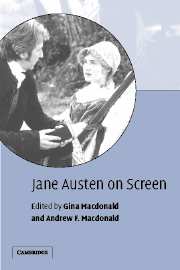Book contents
- Frontmatter
- Contents
- List of illustrations
- List of contributors
- Acknowledgments
- Introduction
- 1 Short “Takes” on Austen: summarizing the controversy between literary purists and film enthusiasts
- 2 Janeite culture: what does the name “Jane Austen” authorize?
- 3 “Such a transformation!”: translation, imitation, and intertextuality in Jane Austen on screen
- 4 Two Mansfield Parks: purist and postmodern
- 5 Sense and Sensibility in a postfeminist world: sisterhood is still powerful
- 6 Regency romance shadowing in the visual motifs of Roger Michell's Persuasion
- 7 Filming romance: Persuasion
- 8 Emma, interrupted: speaking Jane Austen in fiction and film
- 9 Reimagining Jane Austen: the 1940 and 1995 film versions of Pride and Prejudice
- 10 Emma and the art of adaptation
- 11 Clues for the clueless
- Questions for discussion
- Filmography
- Bibliography
- Index
1 - Short “Takes” on Austen: summarizing the controversy between literary purists and film enthusiasts
Published online by Cambridge University Press: 05 June 2012
- Frontmatter
- Contents
- List of illustrations
- List of contributors
- Acknowledgments
- Introduction
- 1 Short “Takes” on Austen: summarizing the controversy between literary purists and film enthusiasts
- 2 Janeite culture: what does the name “Jane Austen” authorize?
- 3 “Such a transformation!”: translation, imitation, and intertextuality in Jane Austen on screen
- 4 Two Mansfield Parks: purist and postmodern
- 5 Sense and Sensibility in a postfeminist world: sisterhood is still powerful
- 6 Regency romance shadowing in the visual motifs of Roger Michell's Persuasion
- 7 Filming romance: Persuasion
- 8 Emma, interrupted: speaking Jane Austen in fiction and film
- 9 Reimagining Jane Austen: the 1940 and 1995 film versions of Pride and Prejudice
- 10 Emma and the art of adaptation
- 11 Clues for the clueless
- Questions for discussion
- Filmography
- Bibliography
- Index
Summary
The following three short essays briefly and clearly establish the boundaries of the academic argument over Jane Austen's novels made into film, with Professor Roger Gard taking the conservative, or purist, position, with New Zealand filmmaker and scriptwriter Gaylene Preston taking the liberal, film community position, and with Kate Bowles looking to the future and the ways in which technology will change our relationship to Jane Austen, the historical figure, and her works, which speak to us today in ways Austen never imagined. The longer essays which comprise this text explore these broad questions, answering them through the case studies of individual novels and the film productions associated with them.
Roger Gard's eloquent defense of the uniqueness of literary experience is both dismissive of film's claims – the “artistic paucity of mere looking” at surfaces – and systematic in enumerating the special gifts of prose – at creating subtlety and perspective, psychological deftness, irony, and a sense of context in time. Gard articulates what most impassioned readers feel after viewing a screen version of a favorite work; appearances may be wonderfully particularized (though at a great loss to imagination and variety), plot may be dutifully unfolded in basic outline, but the essence of what makes the work worthy is lost, or at least, sadly depleted. Professor Gard's stout defense will stand for one pole in the discussions which follow, the high ground of literary sensibility, which many feel can only be approached, not occupied, by cinema.
- Type
- Chapter
- Information
- Jane Austen on Screen , pp. 9 - 21Publisher: Cambridge University PressPrint publication year: 2003
- 1
- Cited by



